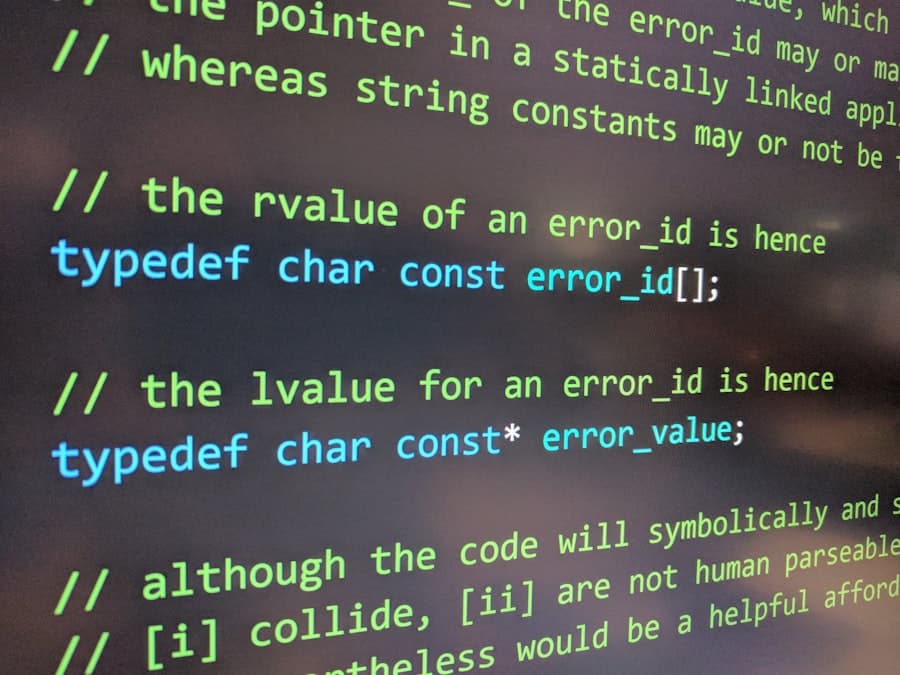In an era defined by rapid technological advancement, coding literacy has emerged as a fundamental skill akin to reading and writing. The digital landscape permeates every aspect of our lives, from the way we communicate to how we conduct business and access information. As society becomes increasingly reliant on technology, understanding the principles of coding is no longer confined to computer science majors or software developers.
It is essential for individuals across various fields to grasp the basics of coding to navigate the complexities of the modern world effectively. Coding literacy empowers individuals to engage with technology critically and creatively. It fosters problem-solving skills, logical thinking, and a deeper understanding of how digital tools function.
For instance, when individuals learn to code, they gain insight into the algorithms that drive social media platforms, e-commerce sites, and even the apps on their smartphones. This knowledge not only enhances their ability to use these technologies but also equips them to contribute to discussions about ethical considerations, data privacy, and the societal impacts of technology. In this way, coding literacy serves as a bridge between technology and informed citizenship, enabling individuals to participate meaningfully in a digital society.
Key Takeaways
- Coding literacy is essential in the digital age for understanding technology and its impact on society.
- Non-traditional tech careers, such as marketing and design, benefit from coding skills for data analysis and automation.
- Coding plays a crucial role in healthcare and medicine for developing software, analyzing patient data, and creating medical devices.
- In finance and business, coding literacy is valuable for automating tasks, analyzing data, and developing financial models.
- Creative industries, like graphic design and music production, can benefit from coding skills for creating interactive and dynamic content.
Coding Skills in Non-Traditional Tech Careers
The relevance of coding skills extends far beyond traditional tech roles such as software engineering or web development. In fact, many non-technical careers are increasingly recognizing the value of coding literacy as a competitive advantage. For example, marketing professionals who understand coding can leverage data analytics tools to optimize campaigns and better target audiences.
By being able to manipulate data sets or automate repetitive tasks through coding, marketers can enhance their strategies and improve overall efficiency. Similarly, project managers benefit from coding knowledge as it allows them to communicate more effectively with technical teams. Understanding the basics of programming languages can help project managers set realistic timelines and expectations for software development projects.
This fluency in coding can also facilitate collaboration between cross-functional teams, ensuring that everyone is on the same page regarding project goals and deliverables. As industries evolve and integrate more technology into their operations, the demand for professionals with coding skills in non-traditional tech careers will continue to grow.
The Role of Coding in Healthcare and Medicine

The healthcare sector is undergoing a significant transformation driven by technology, and coding plays a pivotal role in this evolution. Electronic health records (EHRs), telemedicine platforms, and health information systems rely heavily on coding for data management and analysis. Healthcare professionals who possess coding skills can better navigate these systems, leading to improved patient care and operational efficiency.
For instance, a nurse with coding knowledge can efficiently input patient data into EHRs, ensuring accurate records that are crucial for treatment decisions. Moreover, coding literacy is essential for healthcare data analysts who interpret vast amounts of medical data to identify trends and improve patient outcomes. By utilizing programming languages such as Python or R, these analysts can develop algorithms that predict patient readmission rates or analyze the effectiveness of treatment protocols.
This data-driven approach not only enhances clinical decision-making but also contributes to research initiatives aimed at advancing medical knowledge.
Coding Literacy in Finance and Business
In the finance sector, coding literacy is becoming increasingly important as firms adopt advanced technologies like artificial intelligence (AI) and machine learning (ML) for data analysis and decision-making. Financial analysts who understand coding can automate data collection processes, perform complex calculations, and create predictive models that inform investment strategies. For example, a financial analyst proficient in Python can write scripts that scrape financial data from various sources, allowing for real-time analysis and quicker decision-making.
Additionally, coding skills are invaluable for risk management professionals who need to assess potential threats to financial stability. By utilizing programming languages to develop risk assessment models, these professionals can analyze historical data and simulate various scenarios to predict future risks. This capability not only enhances the accuracy of risk assessments but also enables firms to respond proactively to emerging challenges in the financial landscape.
As the finance industry continues to evolve with technology, coding literacy will be a key differentiator for professionals aiming to excel in their careers.
Coding Skills in Creative Industries
The creative industries are often perceived as distinct from the tech world; however, coding skills are increasingly becoming an asset for artists, designers, and content creators. In fields such as graphic design, web design, and digital media production, understanding coding languages like HTML, CSS, and JavaScript can significantly enhance a creative professional’s capabilities. For instance, a web designer who knows how to code can create more interactive and visually appealing websites without relying solely on developers.
Moreover, coding literacy allows creatives to experiment with new forms of expression through generative art or interactive installations. Artists who incorporate coding into their work can create dynamic pieces that respond to user interactions or environmental changes. This fusion of art and technology not only broadens the scope of creative possibilities but also attracts new audiences who appreciate innovative approaches to artistic expression.
As the lines between technology and creativity continue to blur, coding skills will be essential for those looking to thrive in the creative industries.
The Impact of Coding Literacy in Education

In educational settings, coding literacy is increasingly recognized as a critical component of modern curricula. Schools are beginning to integrate coding into subjects beyond computer science, emphasizing its relevance across disciplines such as mathematics, science, and even humanities. By introducing students to coding at an early age, educators are equipping them with essential problem-solving skills and fostering a mindset geared toward innovation.
Furthermore, teaching coding in schools promotes collaboration and teamwork among students. Many coding projects require students to work together to solve problems or create applications, encouraging communication and interpersonal skills. This collaborative environment mirrors real-world scenarios where professionals from diverse backgrounds must work together on complex projects.
As educational institutions continue to prioritize coding literacy, they are preparing students not only for careers in technology but also for a future where digital fluency is paramount across all fields.
The Future of Coding in All Careers
Looking ahead, the future of coding literacy appears bright across all career paths. As technology continues to advance at an unprecedented pace, the ability to understand and manipulate code will become increasingly valuable. Industries that have traditionally been less tech-focused will likely see a growing demand for professionals who possess coding skills.
This trend suggests that future job seekers will need to be adaptable and willing to learn new technologies throughout their careers. Moreover, as automation becomes more prevalent in various sectors, individuals with coding literacy will be better positioned to leverage these tools effectively. Understanding how automation works allows professionals to identify opportunities for efficiency improvements within their organizations while also mitigating potential job displacement concerns.
In this context, coding literacy will not only enhance individual career prospects but also contribute to a more innovative and resilient workforce capable of navigating the challenges of an ever-evolving job market.
Resources for Learning Coding Skills
For those interested in developing their coding skills, a wealth of resources is available today that cater to various learning styles and preferences. Online platforms such as Codecademy, freeCodeCamp, and Coursera offer interactive courses covering a wide range of programming languages and concepts. These platforms often provide hands-on projects that allow learners to apply their knowledge in real-world scenarios.
In addition to online courses, numerous books and tutorials are available for self-study. Titles like “Automate the Boring Stuff with Python” by Al Sweigart provide practical insights into how coding can be applied to everyday tasks. Furthermore, local community colleges and universities frequently offer workshops or evening classes focused on coding fundamentals for beginners.
For those seeking a more immersive experience, boot camps have gained popularity as intensive training programs designed to equip participants with practical coding skills in a short timeframe. These boot camps often emphasize project-based learning and collaboration with peers, simulating real-world work environments. As interest in coding continues to grow across various sectors, individuals have more opportunities than ever before to acquire these essential skills.
Whether through self-directed learning or formal education programs, the path toward coding literacy is accessible and increasingly vital in today’s digital landscape.
In today’s rapidly evolving job market, coding literacy is becoming an essential skill across various careers, as highlighted in the article “How Coding Literacy Is Expanding Across All Careers.” This trend is further supported by advancements in technology, such as those discussed in the article “Discover the Best AI Video Generator Software Today.” The integration of AI tools in creative fields exemplifies how coding and technology are reshaping traditional roles, making it crucial for professionals to adapt and acquire new digital skills to stay competitive. As AI continues to influence industries, understanding coding and software development becomes increasingly important for career growth and innovation.
FAQs
What is coding literacy?
Coding literacy refers to the ability to understand and use computer programming languages to create, manipulate, and automate digital systems and processes.
Why is coding literacy important across all careers?
In today’s digital age, coding literacy is becoming increasingly important across all careers as technology continues to play a significant role in various industries. Understanding coding can help professionals automate tasks, analyze data, and develop innovative solutions.
How is coding literacy expanding across all careers?
Coding literacy is expanding across all careers as more professionals recognize the value of understanding coding languages. Many organizations are offering coding training and resources to their employees, and educational institutions are integrating coding into their curriculums to prepare students for the workforce.
What are the benefits of coding literacy in non-technical careers?
Professionals in non-technical careers can benefit from coding literacy by being able to automate repetitive tasks, analyze data to make informed decisions, and develop digital solutions to improve efficiency and productivity in their respective fields.
What are some common coding languages that professionals should learn?
Some common coding languages that professionals should consider learning include Python, JavaScript, SQL, and R. These languages are widely used across various industries and can provide valuable skills for non-technical careers.

